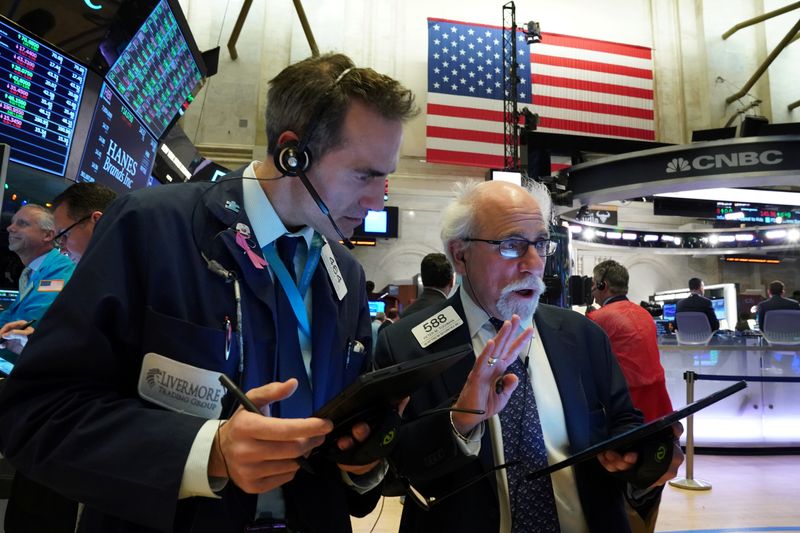By Herbert Lash and Marc Jones
NEW YORK/LONDON (Reuters) - Oil prices surged as much as $3 a barrel as gold, the yen and safe-haven bonds all rallied on Friday after the U.S. killing of Iran's top military commander in an air strike in Iraq ratcheted up tensions between Washington and Tehran.
Traders were spooked after the death of Major General Qassem Soleimani, head of the elite Quds Force who was also one of Iran's most influential figures, and by Iranian Supreme Leader Ayatollah Ali Khamenei's vow of revenge.
U.S. Secretary of State Mike Pompeo said the strike aimed to disrupt an "imminent attack" that would have endangered Americans in the Middle East.
The most dramatic moves were in the oil markets, with Brent crude futures (LCOc1) leaping as much 4.5% to $69.20 a barrel, the highest level since Saudi crude facilities were attacked in September.
The impact hit almost every asset class. [O/R]
MSCI's gauge of stocks across the globe (MIWD00000PUS) declined 0.52%, while its emerging markets index lost 0.40%.
Europe's broad STOXX 600 index (STOXX) fell as much as 1%, but pared losses to close down 0.33%, while shares on Wall Street fell around 0.8% as New Year optimism, which had pushed equity markets to record highs, evaporated.
The yen
"Geopolitics has come back to the table, and this is something that could have major cross-asset implications," said Salman Ahmed, Lombard Odier's chief investment strategist.
"What is critical is how it pans out in the next few days," Ahmed said. "Whether it turns into a theme depends on Iran's reaction and then the U.S. response."
Iran promised harsh revenge. The Quds Force and its paramilitary proxies have ample means to mount a response.
In September, U.S. officials blamed Iran for attacking the oil installations of Saudi Aramco (SE:2222), the state energy giant and the world's largest oil exporter. Iran has denied responsibility for the strikes and accused Washington of warmongering.
The Trump administration then did not respond, beyond heated rhetoric and threats, and markets settled down within a week after Brent surged 14.6%, its biggest one-day percentage gain since at least 1988, on Sept. 16.
The U.S. government and others on Friday urged their citizens in the region either to return home or to stay away from potential targets and public gatherings.
President Hassan Rouhani said the killing would stiffen Iran's resistance to the United States.
Pompeo said in a round of TV interviews that the United States remained committed to de-escalation with Iran but that it had needed to defend itself.
"He (Soleimani) was actively plotting in the region to take actions - a big action as he described it - that would have put dozens if not hundreds of American lives at risk. We know it was imminent," Pompeo told CNN.
Stocks on Wall Street opened down 1%, the lowest point of the session, as losses were later pared a bit.
The Dow Jones Industrial Average (DJI) fell 233.92 points, or 0.81%, to 28,634.88. The S&P 500 (SPX) lost 23 points, or 0.71%, to 3,234.85 and the Nasdaq Composite (IXIC) dropped 71.42 points, or 0.79%, to 9,020.77.
The global gauge and Wall Street indexes set record closing highs on Thursday, extending the year-end rally in equities into 2020.
Brent settled $2.35 higher at $68.60 after rising as high as $69.20.
West Texas Intermediate (WTI) crude (CLc1) rose $1.87 to settle at $63.05 a barrel, after earlier spiking to $64.09 a barrel, its highest level since April 2019.
Graphic: Geopolitical tensions rattle world markets, https://fingfx.thomsonreuters.com/gfx/mkt/13/565/565/MARKETS0301.png
SCRAMBLE TO SAFETY
Yields on German Bunds and U.S. Treasuries - the world's benchmark government bonds that are typically seen as the safest assets - fell sharply.
The 10-year Bund (DE10YT=RR) yield fell 7 basis points to a two-week low of -0.299%, while Bund futures (FGBLc1) were up 0.62% at 172.33 euros.
Benchmark 10-year Treasury notes (US10YT=RR) rose 26/32 in price to yield 1.7916%, from 1.882% late on Thursday.
Spot gold prices hit a high of $1,553.20 an ounce. U.S. gold futures
The dollar index (DXY) rose 0.05%, with the euro (EUR=) down 0.09% to $1.116. The Japanese yen
The focus on geopolitics meant markets paid little attention to stronger-than-expected data from France, where inflation rose 1.6% year-on-year in December, beating analysts' expectations for a 1.4% rise.
German inflation figures were also higher, although unemployment in Europe's largest economy rose more than expected.
The U.S. manufacturing sector contracted in December by the most in more than a decade, with order volumes crashing to near an 11-year low and factory employment falling for a fifth straight month, the Institute for Supply Management said.

(This story corrects MSCI's gauge of stocks across the globe in paragraph 6 to a decline of 0.52% instead of a gain of 0.80%; corrects day of week in paragraph 27 to Thursday instead of Monday)